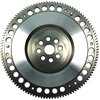D1 Racing Technical Information

Clutch Slippage
Clutch slippage is most commonly caused by a worn cluth disc. Your engine RPM rises rapidly, but your wheels are not rotating correspondingly, as if you your tires can not get traction (when they have). The material on the disc may be glazed or worn down so much that there is not enough material left to transmit power from the engine to the transmission. The causes for this may be from age, heat, abuse, contamination, incorrect installation, or a number of other possible reasons. Regardless of the cause, a slipping clutch will need to be replaced in order for your vehicle to run properly. A slipping disc may quickly damage pressure plate and flywheel surfaces due to excessive heat.
Clutch Release Problems
Clutch release problems are another common issue. Symptoms may include difficult gear changes, grinding, low pedal pressure, and small engagement range. There are varying causes for these problems depending on the type of release system:
Hydraulic Systems
The clutch master cylinder, slave cylinder, lines, or fittings may have a leak.
Mechanical Linkage
Pivot points, push rod, cross shaft, or pedal bracket may be worn out.
Cable Systems
The clutch cable may be binding to the sleeve, worn out, or frayed. Cables tend to wear out with age.
There are a number of other things that can go awry in a clutch system besides the release mechanism. The pressure plate fingers may bind or break. The spline hub may be worn or damaged. Release bearings can seize. The release fork may be bent.
Clutch Chatter
Not to be confused with gear noise, clutch chatter is a vibration coming from the clutch pedal as it engages. The disc is not able to fully mate with the pressure plate and flywheel, resulting in the disc "hopping" over these two surfaces. The causes for this are bent clutch discs (from improper installation), oil contamination, hot spots on the flywheel or pressure plate surfaces, worn input shaft splines, or a worn release bearing (which will make a LOT of noise if it's on its way out).





